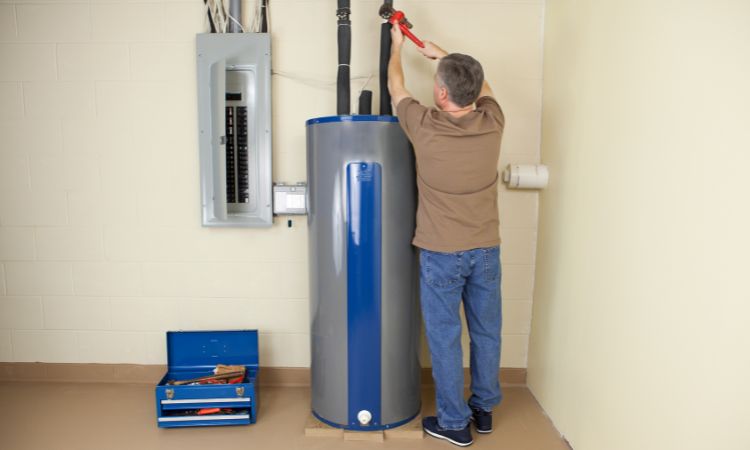Every person has got their own ideas involving Common Problems with Your Home Water Heater.

Imagine starting your day without your regular warm shower. That already sets a bad tone for the remainder of your day.
Every house needs a reliable hot water heater, however only a few understand how to take care of one. One simple method to maintain your hot water heater in top shape is to check for faults on a regular basis as well as fix them as quickly as they appear.
Remember to turn off your water heater prior to smelling about for faults. These are the water heater faults you are most likely to come across.
Water also warm or too chilly
Every water heater has a thermostat that establishes just how warm the water gets. If the water coming into your residence is also warm regardless of establishing a hassle-free optimum temperature level, your thermostat may be malfunctioning.
On the other hand, as well cold water might be because of a fallen short thermostat, a busted circuit, or incorrect gas flow. For example, if you use a gas hot water heater with a damaged pilot light, you would obtain cold water, even if the thermostat is in perfect condition. For electrical heating units, a blown fuse may be the perpetrator.
Inadequate hot water
Hot water heater been available in numerous sizes, relying on your warm water needs. If you run out of warm water before everybody has actually had a bathroom, your water heater is also tiny for your family size. You ought to take into consideration mounting a bigger hot water heater tank or going with a tankless water heater, which occupies less area and also is more resilient.
Weird sounds
There are at least 5 sort of sounds you can hear from a water heater, however one of the most common interpretation is that it's time for the water heater to retire.
Firstly, you need to know with the regular appears a hot water heater makes. An electrical heating system might seem various from a gas-powered one.
Standing out or banging audios normally indicate there is a slab of sediment in your tanks, and it's time to cleanse it out. On the other hand, whistling or hissing noises might just be your valves allowing some pressure off.
Water leaks
Leakages might come from pipelines, water connections, valves, or in the worst-case scenario, the container itself. In time, water will certainly rust the container, and discover its escape. If this happens, you require to change your water heater asap.
However, prior to your change your entire storage tank, make certain that all pipelines are in place and that each shutoff functions flawlessly. If you still need help determining a leakage, call your plumber.
Rust-colored water
Rust-colored water indicates one of your water heater elements is corroded. It could be the anode pole, or the container itself. Your plumber will be able to recognize which it is.
Lukewarm water
Despite just how high you established the thermostat, you won't get any warm water out of a heating unit well past its prime. A hot water heater's efficiency might reduce with time.
You will additionally obtain lukewarm water if your pipes have a cross connection. This suggests that when you activate a faucet, hot water from the heater moves in alongside normal, cold water. A cross connection is easy to place. If your hot water taps still follow shutting the hot water heater valves, you have a cross link.
Discoloured Water
Rust is a major cause of unclean or discoloured water. Corrosion within the water container or a failing anode pole could trigger this discolouration. The anode pole safeguards the container from rusting on the inside as well as ought to be examined annual. Without a pole or an appropriately operating anode pole, the hot water rapidly rusts inside the container. Call a professional water heater professional to determine if replacing the anode rod will repair the problem; if not, replace your water heater.
Conclusion
Ideally, your hot water heater can last one decade before you need an adjustment. Nonetheless, after the 10-year mark, you might experience any one of these faults more frequently. At this moment, you should include a brand-new hot water heater to your budget.
How To Troubleshoot 3 Common Water Heater Problems in Twin Cities
The Water Heater Is Leaking
- A leaky cold water inlet valve
- A loose pipe fitting
- A leaky temperature and pressure relief valve
- A corroded anode rod
- A cracked tank
Turn Off Your Water Heater:
- Shut off your gas water heater by turning the gas valve on the unit to the “OFF” position.
- Shut off your electric water by switching its power off at your electrical panel. Look for a two-pole breaker labeled “water heater” and turn it to the “OFF” position. Move the ball valve connected to the water heater to be perpendicular to the piping at a 90° angle.
Look for the Leak:
Depending on whether the water is coming from the tank's top or bottom, you’ll want to look for the leak in different locations.
If the leak comes from the top of the tank, carefully look for water escaping from the cold water inlet valve or loose pipe fittings. Rusted hot and cold water valves can have loose connections with the tank, with water leaking out of them.
https://mspplumbingheatingair.com/blog/how-to-troubleshoot-3-common-water-heater-problems
I ran across that blog posting on Water Heater Repair and Troubleshooting while doing a lookup on the web. Those who liked our page kindly do not forget to share it. Many thanks for your time. Please check our site back soon.
Resolve today, dial!
Comments on “Exploring Water Heater's Challenges”